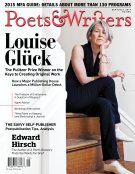Beth McCabe is the director of the Rona Jaffe Foundation Writers’ Awards program, which distributes annual grants of thirty thousand dollars each to six emerging women writers of poetry, fiction, and creative nonfiction. Established in 1995 by the late novelist Rona Jaffe, the program has awarded more than $1.5 million to women writers since its launch. As the foundation marks its twentieth anniversary, McCabe, who will announce the 2014 award recipients this month, spoke about the growth of the awards program.
 What do you mean by an “emerging” woman writer?
What do you mean by an “emerging” woman writer?
For us, it’s a woman writer who is still working on her first manuscript. I wouldn’t say we have a no-book rule, but in the last five or six years we’ve really made it a priority to support women with promising careers who haven’t published a book.
How has the nominee pool changed?
Well, the quality has certainly risen. I think that goes hand in hand with publishers, academics, and writers getting to know the award and what we’re all about. I’ve also noticed in the last five years or so that the nominees have gotten younger. We always get a spectrum—we’ve even had one or two in their seventies—but most have been in their thirties, and in the last five years there’s been a noticeable increase of nominees in their twenties.
Why do you think that is?
It might be that talent is being tapped earlier these days. Agents and editors are going to MFA programs and writers conferences, and the writers who are there tend to be much younger than they might have been, say, ten or fifteen years ago.
Was the Rona Jaffe Writers’ Awards program very different in the beginning?
It was quite modest. We had seven or eight awards—about $3,000 to $7,800 each—and they were given for much more specific support. A young woman would say, “Oh I need to buy a new computer,” or “I need day care one day a week.” After about ten years, we decided to raise the amount to ten thousand dollars each and to make it uniform, across the board, so that writers were no longer asking for specific kinds of funding, but being evaluated based on the quality of their work.
And their potential.
Exactly. A writer friend told me the thing she likes most about the awards program is that it’s about the writing over time. It’s not about a book. I hadn’t ever thought about it in those words, but I liked the way she phrased it: supporting a writer in her career. That is something we try to achieve with the program. That first book might come out within a year of the award, or in three years, or in ten years, but the support and recognition that writers get from the award will allow them to continue onward with the process and the journey.
The makeup of the selection committee is always a secret. Do judges serve for several years, or do you rotate people in and out?
I change the committee of judges every year. It’s one of the ways I try to keep the program as open and fresh as possible. It’s a small group—three writers, one in each genre. It’s important that they each are very confident reading across genres because the panel reads everything and everybody weighs in on everything.
How do you plan to commemorate the twentieth anniversary?
We’re not doing a huge splash, but we will hold our annual reading for the winners at New York University on September 19. Otherwise, we hope to spend the year doing what we do best.
Amanda Calderon is a poet in Brooklyn, New York. Her work has been published or is forthcoming in Poetry and the Kenyon Review.






